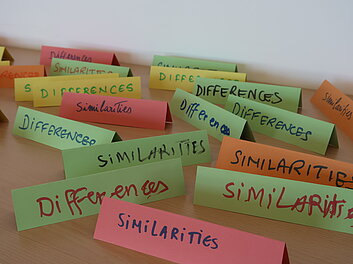Review of the Adult Education Academy 2021
04/29/2021Each year in February, students from around the world meet each other at the University of Wuerzburg to explore international perspectives on adult education and lifelong learning. This year, the Adult Education Academy was implemented as successfully as in former years – but under special conditions: the coronavirus pandemic called for a fully virtual mode of delivery.
For the 8th time, the Professorship of Adult and Continuing Education at the University of Wuerzburg organized the Adult Education Academy, which took place on 1–12 February 2021. The aim is to enable exchanges between master’s and doctoral students and with adult education practitioners from around the world. In this way, individuals can compare and expand their individual knowledge and experience. The Academy enrolled 72 participants from 24 countries, including Hungary, Italy, India, Germany, Brazil, Nigeria, Russia and Palestine.
Focus on connecting theory and practice
In the first week of the Adult Education Academy, participants took a deeper look at strategies and theories in adult education. For this purpose, participants were divided into two groups, each with a different focus. Prof. Regina Egetenmeyer, who is head of the Professorship of Adult and Continuing Education in Wuerzburg, and Prof. Paula Guimarães, DAAD visiting professor from the University of Lisboa (Portugal) served as moderators in the first group, supported by guest lecturers from adult education theory and practice. Participants honed their analytical skills by examining and analysing different perceptions of adult education. Prof. Licínio Lima from the University of Minho (Portugal) led the second group. This class was based on readings and discussions of selected writings by Paulo Freire. Participants in the third class developed theoretical-analytical abilities on adult education.
These theoretical insights were complemented by virtual field visits at adult education institutions in and around Wuerzburg for all groups. Students got to know local adult education institutions such as the German Plastic Centre, the Public Fire Fighting Academy and Rudolf Alexander Schröder House in Wuerzburg but also the Volkshochschule in Gerolzhofen and Robert Kümmert Academy in Eisingen. Furthermore, students had the opportunity to virtually visit international adult and continuing education associations such as the Institute for International Cooperation of Deutscher Volkshochschul-Verband (DVV International), the International Council for Adult Education (ICAE) and the European Association for the Education of Adults (EAEA). The participants were very interested and excited to gain in-depths insights into these institutions. For them, the exchange of theory and practice was very important.
Comparative groups: An international comparison of structures in adult education

During the second week of the Adult Education Academy, participants worked in nine small groups, so-called “comparative groups”, to compare aspects in adult education. One group, for example, explored innovative teaching practices used by teachers and educators during COVID-19. Another group compared challenges and ways for refugees to access higher and adult education in different countries. Comparing countries helped participants to analyse the similarities and differences in the structures of various systems of adult education.
On the last day of the Adult Education Academy, participants presented the results of their group work to the other groups in virtual Zoom meetings and on webpages, created on WueMahara. The presentations were a great way to wrap up the two weeks of the Adult Education Academy.
Coronavirus pandemic calls for creative solutions: Implementing the first online AEA
In this extraordinary semester of 2020/21, the organisers of the Adult Education Academy had to overcome many challenges concerning the organisation and implementation of the project. Because of the pandemic, participants were unable to travel to Wuerzburg to exchange their knowledge and opinions on adult education and lifelong learning issues in a personal way. It was the first time since the Academy’s founding in 2014 that students did not have the opportunity to meet in Wuerzburg face to face. But thanks to the organisers’ creativity and engagement and participants’ motivation and endurance, the Adult Education Academy could be delivered virtually and with great success. Despite the circumstances of the pandemic, students collected many new experiences and a big amount of knowledge from their interesting theoretical and practical insights into lifelong learning and the inspired discussions.
Results from the evaluation completed by the participants of the Adult Education Academy 2021
The 2021 evaluation involved n=61 participants with educational qualifications from 12 different countries, with the sample varying over the course of the evaluation as not all participants completed the evaluation questionnaire in full. In terms of the impact on respondents' interest in AEA's thematic focus, adult education and lifelong learning, all results in 2021 were higher than in previous years. All mean scores increased, ranging from 4.31 to 4.56 (N=55) on the 5-point scale (2020: 4.04 to 4.29, 2019: 4.16 to 4.31). About 85% of the people who participated in the evaluation indicated that their understanding about adult education and lifelong learning in other countries has improved strongly to very strongly. The overall satisfaction of the participants can be rated as particularly high this year compared to previous years, ranging from 4.45 points (Master's students) to 5.00 points (doctoral students) on a scale of up to 5 points (highest satisfaction). This can be classified as a great success. The participants were also asked to rate the individual components of the Adult Education Academy 2021 in terms of their usefulness. The online preparation phase was rated very positively with values between 4.38 and 4.61. The participants were also asked to rate the individual components of the Adult Education Academy 2021 in terms of their usefulness. Special attention should be drawn here to the evaluations of the module "Employability in adult education": This year, the results were significantly higher with mean values of 4.42 to 4.53 than in the previous year with mean values of 3.61 to 4.11. The participants thus very well received the employability module.
You can find the full evaluation report HERE.





